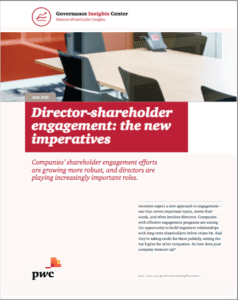 Investors expect a new approach to engagement—one that covers important topics, meets their needs, and often involves directors. Companies with effective engagement programs are seizing the opportunity to build important relationships with long-term shareholders before crises hit. And they’re taking credit for them publicly, setting the bar higher for other companies. So how does your company measure up? PwC’s Governance Insights Center has released a new piece of thought leadership to explain.
Investors expect a new approach to engagement—one that covers important topics, meets their needs, and often involves directors. Companies with effective engagement programs are seizing the opportunity to build important relationships with long-term shareholders before crises hit. And they’re taking credit for them publicly, setting the bar higher for other companies. So how does your company measure up? PwC’s Governance Insights Center has released a new piece of thought leadership to explain.
What are the new imperatives for directors?
Not so long ago, management, usually through investor relations, was responsible for any communications with shareholders. Directors had little or no contact with shareholders beyond attending the annual general meeting—and that’s pretty much the way the directors liked it. But things began changing rapidly, starting when shareholders got say on pay votes in 2011.
Directors (especially compensation committee chairs) began speaking with investors when companies failed or came close to failing their say on pay votes. Directors also started meeting with major shareholders when there were high- profile shareholder proposal campaigns and proxy contests.
Download PwC’s paper here to learn more about leading practices in director-shareholder engagement, what directors should expect of management, and what the best company disclosures look like.
To discuss the findings in greater detail, please contact Paula Loop.
Visit PwC’s Governance Insights Center on the web.
This post was submitted by our partners at PwC Governance Insights Center.




